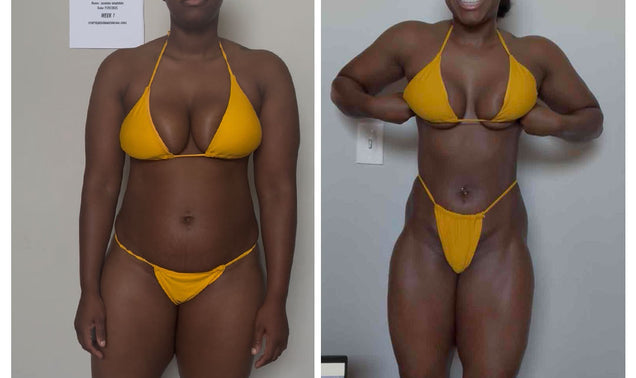While low carb diets may seem all the rage these days (especially with the emergence of diets like Keto and Carnivore), the truth is that low carb diets have been around for decades.
You, yourself, may have even considered giving low carb diets a shot in an effort to kick the on-again, off-again dieting cycle once and for all.
At the same time, you might have reservations if a low carb diet is right for you or if it will even be effective.
Rest assured that both high carb and low carb diets can work for weight loss.
Numerous studies have shown this to be true.[1,2,3]
The single biggest factor in the success (or failure) of any diet is adherence. Some people feel less hunger and greater satiety eating more fat and less carbs while dieting for fat loss while others are just the opposite. They thrive on higher carbs and lower fat intake.
We say this so that you realize there is no one perfect diet for everyone. Diet is highly individualistic. What works for you may not work for someone else. And, what works for you now may not work for you 5 years from now.
With that said, let’s go over some beginners do’s and don’ts for low carb diets if you’re ready to give it a shot!
Do’s and Don’ts for Low Carb Diet
Don’t Expect Rapid Weight Loss to Last
One of the main reasons that low carb diets are so popular is that they result in rapid weight loss within the first few days of dieting. In fact, it’s not uncommon to shed 5-10 pounds during the first week or two.
However, as the weeks pass, the rate of weight loss slows to a more reasonable level of 1-2 pounds per week.
When this happens, many individuals become discouraged.
But, don’t let this happen to you.
What you need to realize is that the initial surge of weight loss with low carb diets is almost all water weight loss, not fat loss.
After the “break in” period of the diet (losing stored glycogen and water weight), actual fat loss will take place, which if you’re doing things right is usually 1-2 pounds per week (depending on your starting weight and how much fat you have to lose).
Don’t Over Exercise
It can be tempting when dieting to try to accelerate your results (especially if you’re taking part in a transformation challenge) by significantly increasing the amount of intense exercise you do (resistance training, cardio, HIIT, etc.).
While exercise is a crucial cog in your weight loss machinery, we hasten caution that you don’t overdo it.
You see, when you are dieting (especially on low carbs), your ability to recover is impaired.
Exercising too intensely too often can lead to overtraining, injury, and muscle loss along with a weight loss plateau.
You do need to train hard, but the focus of your training should be resistance training as that provides the stimulus your body needs to retain muscle in the midst of a calorie deficit.
Cardio can be done in moderation so long as it doesn’t detract from your resistance training sessions or impair your recovery.
If you are going to go low carb and still try to hit hard workouts multiple times per week, it may help to play around with nutrient timing.
For example, have the majority of your carbs in your pre workout meal, which gives you the energy needed to go all-out in your workout. You may also consider an intra workouts supplement, such as His or Her BCAA/EAA or Sport Amino.
Don’t Be Frazzled By Minor Changes on the Scale
While you might be enjoying the low carb life, there will come a point when you either reach your weight loss goals, and/or simply want to bring carbs back into the diet.
When you do have a higher carb day, realize this -- your scale weight the day after will be higher, up to five pounds or so.
This is completely normal and not the result of fat gain.
You see, when you eat carbohydrates your body stores them in muscle and liver cells as glycogen. In doing so, for every gram of glycogen that is stored, your body also stores 3 grams of water.
As you may recall from above, when you cut out carbs from the diet, you lose a lot of water weight the first week or two on the diet.
It should come as no surprise then that when you bring carbs back into your nutrition plan that your body will retain more water, which will artificially inflate your scale weight.
This normalizes after a day or two and you’ll be back to your normal body weight again.
This brings us to our next point…
Do Plan Carb Refeeds
There’s no other way to put it, carbs fuel performance, recovery, and muscle growth.
Without them in your diet, your ability to maintain a high level of performance for considerable lengths of time during training are severely hampered.
Besides, carb-rich foods are also insanely delicious and filling.
But, there’s more reasons to strategically implement carbs into your diet.
When you diet, the hunger hormone leptin increases, which is why you feel hungry pretty much all the time when cutting.
Planning a couple high carb “refeed” days can help reset leptin levels, keeping hunger in check and allowing you avoid any potential fat loss plateaus too.
Furthermore, carbohydrates also boost insulin levels, which have anti-catabolic properties, meaning they help prevent muscle breakdown.
Lastly, carbohydrates also help you to train with greater intensity and recovery more quickly from hard training sessions.
Do Eat Your Fruits & Veggies
Just because you’re going on a low-carb diet doesn’t mean you have to eliminate all manner of carbohydrate intake. If we’re being honest, you should keep some carbohydrates in your diet, namely fruits and vegetables.
These foods are nutritional powerhouses containing essential vitamins, minerals, fiber, and antioxidants which support health and wellness.
Moreover, fruits and veggies are very filling (due to their fiber and water content) but are low in total carbohydrates and calories.
You may be ditching the bread and pasta while on a low carb diet, but there’s no reason to completely eliminate fruits and vegetables. They’re some of the healthiest foods on the planet.
Do Consume Enough Fluids & Electrolytes Hydrate
As we mentioned a couple of times already, when you embark on a low carb diet, you lose a lot of water weight in the initial stages of the diet.
Along with this water loss comes the loss of essential minerals (electrolytes), like sodium, potassium, and magnesium.
The combination of water and electrolyte loss can lead to dehydration, fatigue, weakness, and brain fog.
This is why many people report feeling very tired and lethargic the first few weeks on a low carb or ketogenic diet.
As such, it’s vital that you keep a close eye on your water and electrolyte intake.
To support your fluid and electrolyte intake, try 1UP His or Her BCAA/EAA or Sport Amino.
These supplements not only add a great, refreshing flavor to water, but they also help support hydration and performance thanks to the added electrolytes in Sport Amino.
References
- Tay, J., Luscombe-Marsh, N. D., Thompson, C. H., Noakes, M., Buckley, J. D., Wittert, G. A., Brinkworth, G. D. (2015). Comparison of low- and high-carbohydrate diets for type 2 diabetes management: a randomized trial. The American Journal of Clinical Nutrition, 102(4), 780–790. https://doi.org/10.3945/ajcn.115.112581
- Thomson, C. A., Stopeck, A. T., Bea, J. W., Cussler, E., Nardi, E., Frey, G., & Thompson, P. A. (2010). Changes in body weight and metabolic indexes in overweight breast cancer survivors enrolled in a randomized trial of low-fat vs. reduced carbohydrate diets. Nutrition and Cancer, 62(8), 1142–1152. https://doi.org/10.1080/01635581.2010.513803
- Johnston, C. S., Tjonn, S. L., Swan, P. D., White, A., Hutchins, H., & Sears, B. (2006). Ketogenic low-carbohydrate diets have no metabolic advantage over nonketogenic low-carbohydrate diets. The American Journal of Clinical Nutrition , 83(5), 1055–1061. http://ajcn.nutrition.org/content/83/5/1055.abstract






